Staying Home. Staying Safe. Shopping More.
The Accelerating Shift To Online Shopping

Long before Covid-19 made ordering everyday items a necessity rather than a convenience, online shopping had been an increasingly appealing option for consumers. Globally, e-commerce increased to $3.5 trillion in 2019 up from $1.5 trillion in 2015. With the myriad issues the pandemic has caused for brick and mortar retail, online commerce is expected to expand by another $700 billion this year representing a 19% year-over-year increase in spending. This growth has no signs of slowing down; 2021 projections are already reflecting more than 17% growth, taking the expected outlay to nearly $5 trillion next year. Rather than anticipating a plateau on the back of such huge growth, economists only see this trend expanding in the coming years as consumption practices put in place across shopping, dining and entertainment during 2020 become the new normal. In just 3 short years, global e-commerce is expected to add another 56% expanding to over $6.5 trillion by 2023. (eMarketer)

Online Sales Trend 2014 – 2023
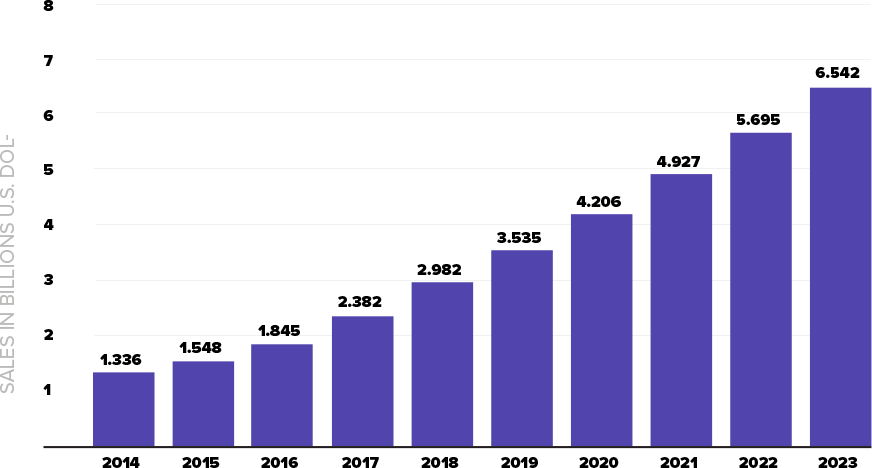
Details: Worldwide; eMarketer; 2014 to 2019
© Statista 2020
Businesses large and small face the challenge of catering to consumers who have become increasingly comfortable shopping for all types of goods online rather than at a physical location. It’s clear that what were gradual changes in the ways consumers shop and live are now rapid changes as preference has given way to necessity. This trend will only continue at a faster pace post-pandemic with 39% of consumers saying they’ll shop both online and in-store and 28% saying they’ll be shopping online only. For businesses to compete and survive, understanding not only how purchases are being made but also how to best connect with your customers in order to drive more online sales is now the key component to success.
Most consumers will mix online and store shopping after covid subsides how will you shop when life returns to “normal”?
Source: Selligent. July 2020
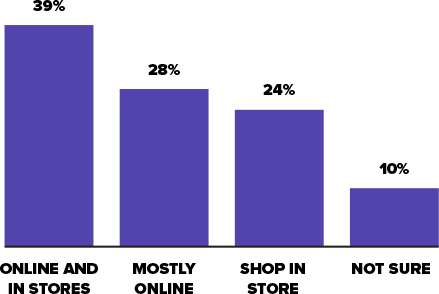

Online Shopping in the time of Covid-19
As consumers have become used to spending nearly all off their time at home this year, the way they shop and what they buy has shifted. Since the beginning of the pandemic, 36% of consumers report shopping online each week compared with 28% pre-Covid-19. (Selligent) Online spending increased by half or more in each month April – July compared with the year prior. Purchases on devices driven by apps are taking center stage. Statista estimates that by the end of 2021, 73% of ecommerce will be conducted via mobile.
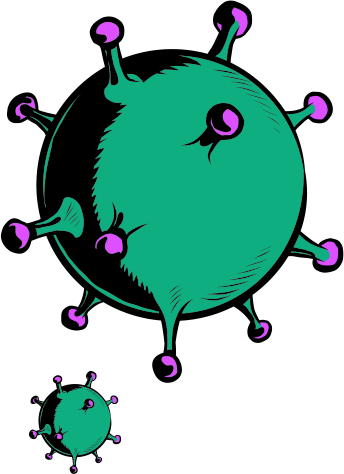
Year-over-year
online sales
growth
Source: Adobe Analytics. August 2020
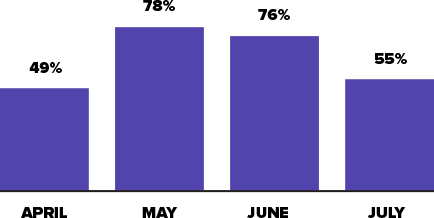
In terms of the categories that this behavioral shift affects most, online grocery shopping is often the first area that comes to mind. After surprisingly posting its first ever monthly profit in April ($10 million), Instacart is expecting to process over $35 billion in grocery sales in 2020. This level of business wasn’t expected by investors before 2025.
This trend is hardly limited to grocery shopping. From Toys & Games (+135%), to Hardware (+80%), to Furniture (+61%), to Office Supplies (+57%), consumers have increased shopping online considerably to keep up with a new lifestyle focused more on home & family while also working from home.
Retail Page Views
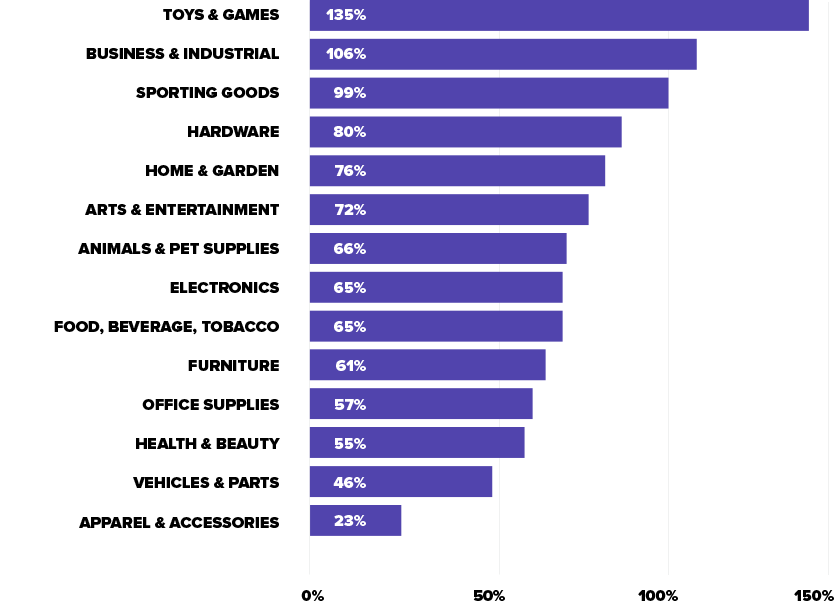
Source: Bazaarvoice Network data
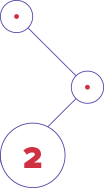
From Black Friday to online everyday
The Holiday shopping season started at perhaps its earliest point ever in 2020. Amazon moved Prime Day to October 13-14 in the hopes of leveraging the event to kickstart seasonal shopping. According to Salesforce, online holiday sales were already expected to grow more than 30% before the decision was made. If the success of Prime Day is to be an indicator of the success of online selling throughout this season, earlier estimates may be too low. eMarketer reports that the event pulled in $10.4 billion dollars which represents an increase of an astounding 45% over 2019 totals.
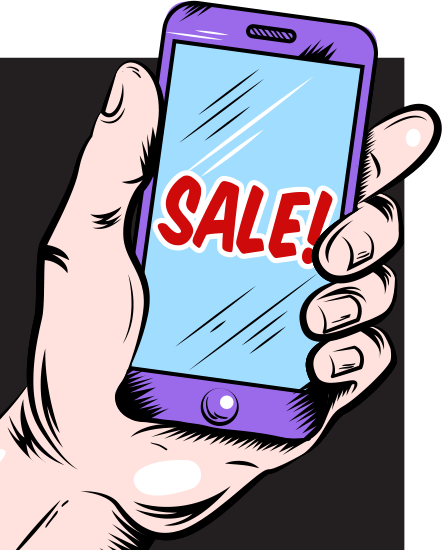
global amazon prime day sales from 2015 to 2020
(in billion US dollars)
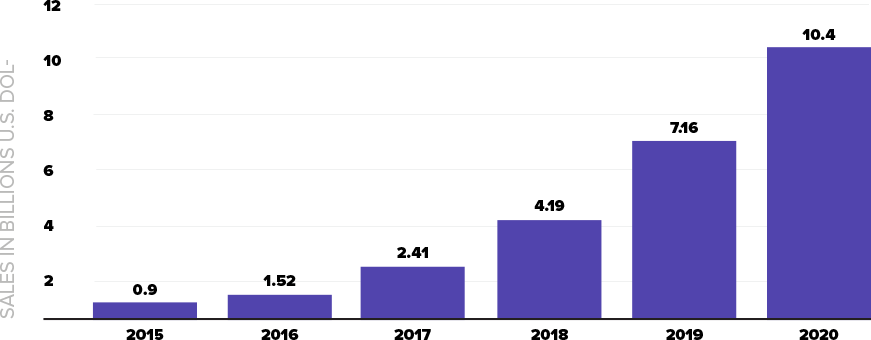
Details: Worldwide; Internet Retailer; 2015 to 2020; all values are estimates
© Statista 2020
As for how these consumers expect to engage online with their favorite retailers, shopping apps are predicted to be a significant driver of sales. U.S. consumers are predicted to spend more than 1 billion hours in shopping apps on Android devices alone during the fourth quarter, a 50% increase from the same time last year. (App Annie)
forecasted hours spent in shopping apps during the 2020 holiday season (united states)
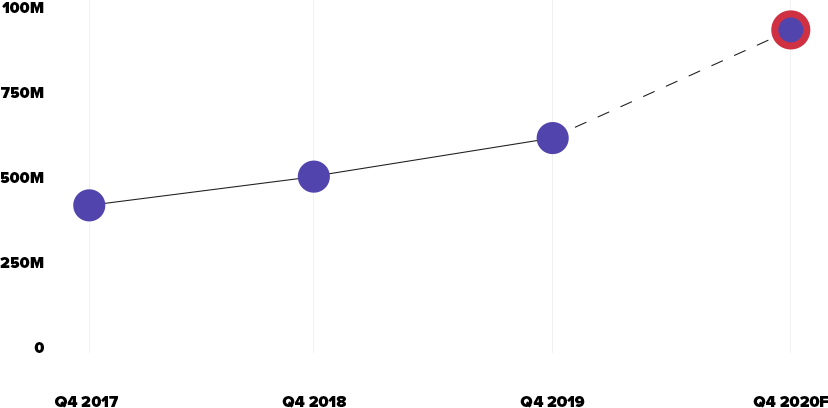
Note: Android devices
Source: App Annie
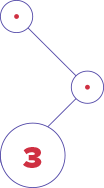
The role of integrations in driving online action
Major brands are facing the challenge of shifting their strategies, messaging and measurement from a focus on driving foot traffic to one centered on driving online traffic. Many are looking at the marketing approaches established by smaller, direct to consumer brands, especially in the influencer marketing space, as a model for their own approaches.
Even during the economic hardships brought on by the pandemic, influencer marketing has proven to be a reliable driver of sales for many direct to consumer brands. The channel offers a unique and authentic way for a brand to connect with audiences directly and without interruption, while carrying the added benefits of measurement and optimization. When a product is integrated into influencer content that offers consumers a direct line to purchase, the resulting online sales lift can be exceptional.

The purpose of advertising is to drive measurable KPIs that concretely affect the business’ bottom line. The magic of what BEN does is found in how we leverage both structured and unstructured data to integrate a company’s marketing message seamlessly into the right content - reaching the right audiences with the right trusted voices for the brand. By following the data in identifying this perfect mix, and tracking the impact down to a brand’s bottom line, we are able to optimize and deliver results in ways we’re always proud of.line, we are able to optimize and deliver results in ways we’re always proud of.
and Performance Marketing
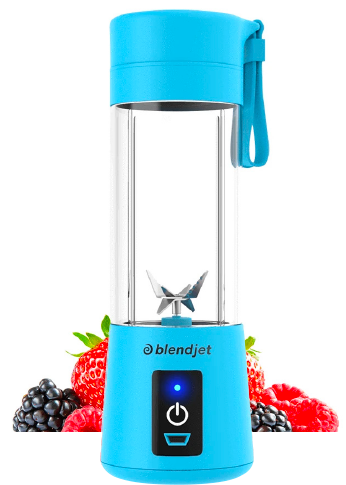
Blendjet Campaign
Performance
Increased sales by 457%
48% decrease in customer acquisition cost
9x conversions in just 3 months
In the case of the Blendjet portable blender, the popular kitchen tool had a goal of driving online sales while keeping acquisition costs low. To deliver the stated KPIs, BEN used a combination of human expertise and AI to identify verticals, platforms, and influencers with the most engagement and purchase intent. Through optimizations the campaign increased sales by 457% and decreased the customer acquisition cost month over month. BEN AI surfaced many critical insights related to content creation (keeping both the content and creator in shot is most effective) and what types of creators convert the best (moms, fashion, and interior design overperform). Uncovering these important insights allowed Blendjet to increase online sales while scaling their success along the way.
NOOM weight loss system looked to drive app downloads and in-app signups of their fun and easy-to-use programs that help users “develop a healthier relationship with food.” Influencers were employed to showcase how the app helps consumers watch what they eat.
BEN’s AI predicted expected conversion rates from influencers from all different vertical types in order to deliver the lowest cost-per-action campaign possible. Human experts then contracted those influencers to create high-performing content for the brand. Influencers outperformed all expectations while conversion rates increased exponentially, growing 323% in the first three months.
Using AI-driven insights on best-performing verticals and the highest-engaging content, NOOM continued to both optimize performance results and increase scale by 37%. They saw nearly 3x the number of clicks as before. BEN became one of NOOM’s leading affiliate partners, driving the most month-over-month conversions.

NOOM Campaign Performance
+323% in conversion rates first 3 months
3x click rate
+37% increase in scale
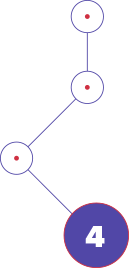
AI’s role in predicting the right channels for you

Influencer marketing works best at scale, when you can optimize to drive more efficient sales. Custom algorithms are essential to this process, and are the key to helping brands transition from in-store sales to online sales.”
AI is a critical element to optimizing an ‘always-on’ influencer strategy. With the constant flow of sales data into our algorithms, BEN was able to build a custom algorithm for Chatbooks that has increased the company’s organic customer acquisition through this marketing channel by over 160%. In addition, AI can optimize for deep funnel metrics such as ‘loyal customers who maintain their subscription for over 3 months’, helping the brand. acquire the customers that will be most profitable to them over the long term.
The shift to online is an amazing opportunity for AI because there’s so much more data to work with and it changes the information brands have available to make efficient and effective marketing choices. Being able to link a view to a conversion at much more pervasive levels changes the game.
AI’s role in predicting the right channels for you
When looking to use influencer marketing as a driver of online sales, an ‘always-on’ strategy has proven to be the best approach. For many brands that have taken advantage of consumers’ shifting preference for online shopping, this approach has resulted in continued improvements in return on advertising spend (ROAS)

Influencer marketing is the closest thing we’ve been able to find to word of mouth marketing. For us, you can’t decide which influencers to work with based on intuition, it has to literally be cold hard data and then being able to take advantage of that data and continue to be able to scale.”

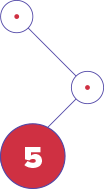
KEY
TAKEAWAYS
1
Covid has accelerated the switch to online shopping
2
Retailers are rapidly changing focus to meet consumer needs in an online world
3
Brands can learn from the ways many direct to consumer brands have achieved success using influencer marketing to drive online sales
4
Content integrations continue to work for brands over time, driving consumer action for considerably longer timeframes than traditional advertising
5
AI predicts the best performing content categories to drive the actions brands are trying to achieve